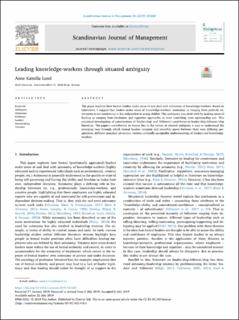Leading knowledge-workers through situated ambiguity
Peer reviewed, Journal article
Published version

Åpne
Permanent lenke
https://hdl.handle.net/11250/2657348Utgivelsesdato
2019Metadata
Vis full innførselSamlinger
Originalversjon
Lund, A. K. (2019). Leading knowledge-workers through situated ambiguity. Scandinavian Journal of Management, 35(3): 101060. doi: 10.1016/j.scaman.2019.101060Sammendrag
The paper explores how formal leaders make sense of and deal with autonomy of knowledge-workers. Based on interviews, I suggest that leaders make sense of knowledge-workers’ autonomy as ranging from perfectly autonomous to too autonomous to less independent to acting childish. This ambiguity was dealt with by making sense of leading as ranging from facilitative and supportive approaches to more controlling, even reprimanding acts. This empirical investigation of constructions of ‘leader/ship’ and ‘followers’ contributes to leader/ship-follower/ship literature. The paper’s contribution to theory lies in the notion of situated ambiguity; a way to understand the emerging way through which formal leaders navigate and smoothly move between their own differing perspectives, different practical situations, various culturally acceptable understandings of leaders and knowledge-workers.
